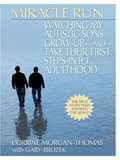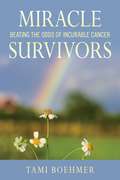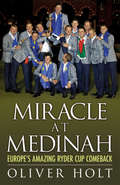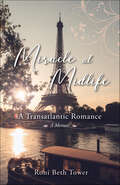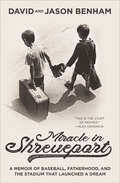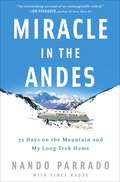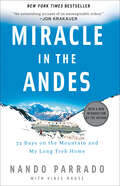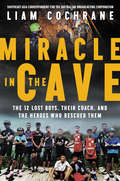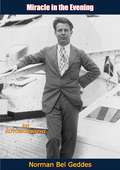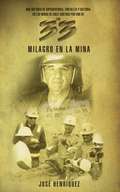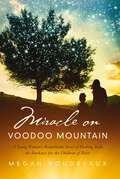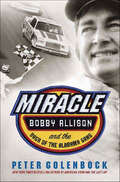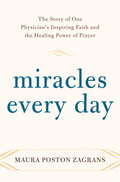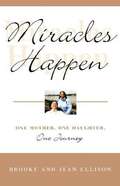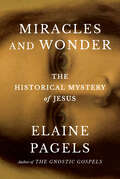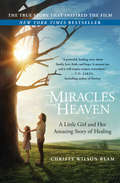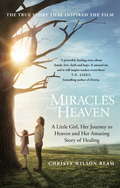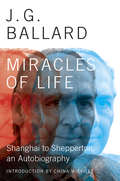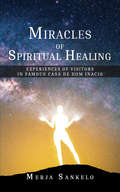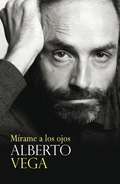- Table View
- List View
Miracle Run
by Gary Brozek Corrine Morgan-ThomasThe inspiration for the Lifetime movie and a guide for parents confronting their autistic children's journeys to adulthood. Parents of autistic children often wonder: What will happen to our kids when they grow up? Can they work? Have relationships and their own families? Here is the poignant story of one woman watching her autistic boys reach adulthood. A single mother barely making ends meet, Corrine Morgan-Thomas could hardly afford doctors for her twins, Stephen and Phillip. After their diagnosis of autism, no one else thought these boys would ever amount to anything. But Corrine managed single-handedly to keep the boys out of institutions-and in "regular" school. And their inspiring story became Lifetime television's Miracle Run. The real miracle, though, was what happened where the movie left off-when Stephen and Phillip graduated to face adult autism. From their diagnosis to the present day, when the boys have grown into young men leading happy lives, Corrine's eye-opening story is full of candor, humor, and most of all, hope.
Miracle Survivors: Beating the Odds of Incurable Cancer
by Tami BoehmerIf you have received an incurable cancer diagnosis, hearing about someone "who made it" is like spotting a rescue ship when you're drowning in a stormy sea. Miracle Survivors provides that lifeline with a collection of stories of cancer survivors who were given a terminal diagnosis but shocked everyone by thriving years past their prognoses. These "miracle survivors" have different cancers and circumstances, but share a poor prognosis and incredible drive to overcome it.After being diagnosed with stage IV breast cancer, award-winning author and blogger Tami Boehmer decided she and others like her desperately needed hope to override the dismal statistics and death sentences provided by many doctors. So she began interviewing incredible men and women from around the country who defied the odds and lived to tell about it.Miracle Survivors will help answer the question: What sets people apart who beat the odds of a terminal or incurable prognosis? Overcoming the odds wasn't something that just happened to those who share their stories. Each person took a very active role in overcoming their challenges, whether it was activating their faith or transforming their lifestyle. Rather than passively accepting their circumstances, they decided to transform them.The book is essential reading for anyone with cancer, their loved ones, and everyone else who wants inspiration to conquer their life challenges.
Miracle at Medinah: Europe's Amazing Ryder Cup Comeback
by Oliver HoltGolf fans will not forget the 39th Ryder Cup in a hurry. Staged at the Medinah Country Club just outside of Chicago, the 2012 event has already gone down as the most remarkable competition in its 85-year history. The American team had home advantage, and a golf course unapologetically set up to suit its own players. Supported by tens of thousands of loud and proud fans, the USA's star-studded line-up dominated the first two days and ended the Saturday with a seemingly unassailable 10-6 advantage. No away team had ever won the Ryder Cup from such an unpromising position. Sunday was singles day, traditionally the forte of American teams. The situation looked bleak, especially when European team member and number 1 golfer in the world, Rory McIlroy, very nearly missed his tee-off time. Yet slowly but surely, the European team - who had top-loaded their line-up in one last throw of the dice - started to turn the scoreboard blue. With inspirational captain Jose Maria Olazabal stiring European blood with thoughts of the late Ryder Cup magician Seve Ballesteros (whose silhouette was emblazoned on the players' sweaters and bags), the tide turned and the previously dominant American players started to crumble in the face of the onslaught. Suddenly European players were holing miraculous putts to win holes out of the blue. Something very special was happening. When German Martin Kaymer sank his putt on the eighteenth green to clinch the point that retained the Ryder Cup, the most astonishing comeback in the event's long and distinuished history was complete. Miracle at Medinah is the compelling narrative of those amazing three days in Illinois, a fitting chronicle of an unbelievable sporting story.
Miracle at Midlife: A Transatlantic Romance
by Roni Beth Tower2017 Gold Medal IPPY Award in Autobiography/Memoir They first meet in Paris in the spring of 1996. David is a divorced American attorney living on a converted barge moored on the banks of the Seine; Roni Beth is an empty-nested clinical and research psychologist working from her home in Connecticut. Now in their fifties, both have signed off on loving again—until they meet each other. Miracle at Midlife tells the inspiring story of Roni Beth and David’s intense and transformative transatlantic courtship. Along the way, David the loner, living amid the beauty, freedom, and pleasures of Paris, brings Roni Beth, a responsible and overextended professional haunted by earlier loss and trauma, back to her core as a woman, while she helps him reclaim connections that tie him to a larger world. They wrestle internal demons (mostly hers) and external threats (friends, family and different perspectives) as they share adventures in their respective worlds. Throughout their journey, stories of courage, joy and integrity bring hope and delight to those who wonder how romantic love appears and evolves; inspiration to people in mid-life who, knowingly or unknowingly, have completed a chapter in their lives and are ready to move on; and comfort to anyone who longs to wrestle and conquer the demons of fear, born of history or of the unknown, and win. Testimony that love is real.
Miracle in Shreveport: A Memoir of Baseball, Fatherhood, and the Stadium that Launched a Dream
by Jason Benham David BenhamTwin brothers David and Jason Benham grew up with big dreams of baseball and an even bigger trust in God. Though they attended a small high school with no baseball field, turned down a professional offer so they could attend college together, and faced more than one missed pitch and injuries, they kept dreaming, praying together on the field, and believing in God&’s provision for their lives.David and Jason&’s journey, from Little League to college to professional baseball and beyond, reminds us that even when we don&’t know what God is up to, He&’s putting together the pieces of our life&’s puzzle and executing the plans He has for each of us.Miracle in Shreveport tells the story of a family&’s love, the power of prayer, and a game that is truly all-American. It is also the story of brotherhood staying strong, despite the threat of comparison in a profession committed to competition. Most of all, it is the story of being faithful in small steps, honoring God in the process, and trusting His hand in our lives. In this book, the Benhams call us to remember that when we follow God&’s dream for us, we find it is better than we could have ever dreamed for ourselves.
Miracle in the Andes: 72 Days on the Mountain and My Long Trek Home
by Vince Rause Nando Parrado30 years after his plane crashed in the Andes, Nando tells the story of how he trekked 45 miles across the snowy Andes to find help.
Miracle in the Andes: 72 Days on the Mountain and My Long Trek Home
by Nando ParradoIn the first hours there was nothing, no fear or sadness, just a black and perfect silence.Nando Parrado was unconscious for three days before he woke to discover that the plane carrying his rugby team, as well as their family members and supporters, to an exhibition game in Chile had crashed somewhere deep in the Andes. He soon learned that many were dead or dying--among them his own mother and sister. Those who remained were stranded on a lifeless glacier at nearly 12,000 feet above sea level, with no supplies and no means of summoning help. They struggled to endure freezing temperatures, deadly avalanches, and then the devastating news that the search for them had been called off. As time passed and Nando's thoughts turned increasingly to his father, who he knew must be consumed with grief, Nando resolved that he must get home or die trying. He would challenge the Andes, even though he was certain the effort would kill him, telling himself that even if he failed he would die that much closer to his father. It was a desperate decision, but it was also his only chance. So Nando, an ordinary young man with no disposition for leadership or heroism, led an expedition up the treacherous slopes of a snow-capped mountain and across forty-five miles of frozen wilderness in an attempt to find help. Thirty years after the disaster Nando tells his story with remarkable candor and depth of feeling. Miracle in the Andes--a first person account of the crash and its aftermath--is more than a riveting tale of true-life adventure: it is a revealing look at life at the edge of death and a meditation on the limitless redemptive power of love.From the Hardcover edition.
Miracle in the Cave: The 12 Lost Boys, Their Coach, and the Heroes Who Rescued Them
by Liam CochraneFeaturing never-before-reported details and exclusive interviews with the boys and their coach, the inspiring true story of how twelve members of the Wild Boar Academy Football Club and their coach survived nine days in a labyrinthine cave in Northern Thailand, and of the incredible men and women who pulled off one of the greatest rescues of all time.For nine days twelve young soccer players and their coach were confined in the dark by rising waters in the caverns of Tham Luang in Chang Rai, Thailand. With no food or drinking water except the condensation found on the cave walls, their survival seemed unlikely. Yet against the odds, a team of determined divers traversed monsoon floodwaters and narrow passageways to find Coach Ek, a stateless orphan devoted to Buddhism, and his young players alive and hopeful. Liam Cochrane spent more than two weeks on the scene, and was stationed outside of the cave entrance in daily contact with divers and other key members of the rescue team, reporting the story for the Australian Broadcast Corporation. In this mesmerizing and inspiring book, he recounts this ultimate race-against-the-clock event. Filled with never-before-reported details based on exclusive access to both the rescue team, Coach Ek, and members of the soccer team and their families, Miracle in the Cave chronicles the Wild Boars’ ordeal in the cave, and the rescue plan that unfolded outside—including the contentious political negotiations, the early misadventure that halted the operation for crucial hours, and the death of Thai Navy SEAL diver Saman Kunan. Going deep inside the area between the Thai and Myanmar border, better known for methamphetamines and illegal wildlife trade, Cochrane guides us through every aspect of the adventure-turned-nightmare-turned miracle: the team’s agonizing wait in the darkness; the rescuers’ battle against the forces of nature; the work of international experts who pooled their skills to help. Chochrane evokes the rollercoaster of emotions every step of the way—the terror, optimism, sadness, and joy of this indelible experience.Filled with a spirit of true grit, Miracle in the Cave is a courageous tale of perseverance and a celebration of an inspiring moment when the world came together in hope.
Miracle in the Evening: An Autobiography
by Norman Bel GeddesMIRACLE IN THE EVENING is the autobiography of one of the most brilliant stage and industrial designers of our time. Norman Bel Geddes’ story is the drama of a young man who, having worked his way through school, climaxed a brilliant career with ideas that gave birth to some of the most spectacular theatrical productions of the last half century.Through Norman Bel Geddes’ story, as through the theater itself, pass the many colorful personalities of our age, lending brilliance and scope, good humor and compelling human interest.The life story of this ingenuous man is filled with names of the glittering and the great, such as Frank Lloyd Wright, Madame Schumann-Heink (his first portrait-sketch was of this famous contralto), Will Rogers, Charlie Chaplin, David Belasco, Horace Liveright, J. Walter Thompson, Walter Chrysler, Harold Ross, and many others—a fascinating story of a man who has more than once created for audiences a MIRACLE IN THE EVENING.
Miracle in the Making: The Adam Taliaferro Story
by Scott Brown Sam CarchidiOn September 23, 2000, Adam Taliaferro had a lot going for him. He was a promising young football player on a full scholarship at Perm State University who seemed to have a career in the NFL in front of him. But after a jarring hit on an Ohio State running back, he woke up flat on his back in a hospital, unable to feel anything below his neck. His doctors said he would probably never walk again. Determined to prove those doctors wrong, Adam and his family embarked on a courageous journey of determination and faith that would end with Adam walking on his own two feet once again. Miracle in the Making is the remarkable story of that courageous achievement over incredibly long odds. It's the story of a recovery called miraculous by his doctors-a story of tragedy and triumph, of hope and inspiration, and a story that will remain with the reader long after the final page is turned.
Miracle in the Mine: One Man's Story of Strength and Survival in the Chilean Mines
by José HenriquezOn October 13, 2010, millions of television viewers on five continents literally stopped everything to watch the amazing rescue of 33 men trapped underground in the mine of San José de Copiapó in northern Chile. What had seemed at first a hopeless tragedy later became a triumph of human effort, courage, perseverance, and expertise. For 17 excruciating days no one knew whether any of the miners had survived the collapse of the mine shaft, nor were the surviving miners aware of any rescue attempts. They spent a total of 69 days trapped underground. And it was there, in that frightening cavern, that one man took on the responsibility of encouraging the others and use the tragedy as an opportunity to share his faith. Miracle in the Mine is the story of José Henríquez. The testimony of a man who was no stranger to danger even before he found himself trapped 2,300 feet under the earth in the San José mine. A man who has unequivocally demonstrated his integrity, courage, and moral strength both before, during, and after the mining accident, and who is now using this experience to inspire the world.
Miracle in the Mountains
by Inez Henry Harnett KaneThe book Miracle in the Mountains: The Inspiring Story of Martha Berry's Crusade for the Mountain People of the South tells the story of the educator and founder of Berry College in Rome, Georgia.
Miracle of Miracles
by Mina NevisaThe story of Mina's conversion from Islam to Christianity. A must-read for anyone who wants to reach out to Muslims, or better understand their faith.
Miracle on Voodoo Mountain: A Young Woman's Remarkable Story of Pushing Back the Darkness for the Children of Haiti
by Megan Boudreaux"It took months of God waking me up in the middle of the night before I realized I was the one He was calling to leave my comfortable American life and move to Haiti."Miracle on Voodoo Mountain is the inspirational memoir of an accomplished and driven 24-year old who quit her job, sold everything, and moved to Haiti, by herself—all without a clear plan of action. Megan Boudreaux had visited Haiti on a few humanitarian trips but each trip multiplied the sense that someone needed to address the devastation—especially with the children, many of whom were kept as household slaves on the poverty-stricken and earthquake-devastated Caribbean island.God guided her every step as she moved blindly to a foreign land without knowing the language, the people, or the future. From becoming the adoptive mother of former child slaves, to receiving the divine gift of the Haitian Creole language, to starting, building, and running a school for more than 500 children, "the amazingness of what God did after I made the choice to be obedient is incredible," said Megan.Three years later, six acres on Bellevue Mountain in Gressier is the home of the nonprofit Respire Haiti at the former site of voodoo worship, and in the area that many still come to make animal sacrifices, Megan and her staff of nearly 200 are transforming this community as they educate, feed, and address the needs.
Miracle: Bobby Allison and the Saga of the Alabama Gang
by Peter GolenbockFor the first time, Miracle presents the full story of NASCAR legend Bobby Allison and the Alabama Gang--written with the corporation of the Allisons.While you were sitting in the stands or watching at home on TV, did you ever ask yourself what's really going on behind the scenes? Take a ride on the seat next to auto-racing legend Bobby Allison and relive the dramatic saga of the Alabama Gang in this unique look at NASCAR from the inside.Bobby Allison, who ranks fourth in wins in NASCAR history, began his Grand National/Winston Cup career in 1966. After winning eighty-five races, he retired in 1988 when an accident at Pocono Raceway nearly killed him. He was severely brain injured, and it took him a full fifteen years to recover. After the accident, more tragedy struck. In 1992 his younger son, Clifford, died in a crash at the age of twenty-seven. A year later, his other son, Davey, died in a helicopter accident, and in 1994 he lost his close friend and protégé Neil Bonnet in a fatal crash. Then Bobby and his wife, Judy, separated and divorced. Through it all Bobby Allison persevered.Today Bobby's mind is as sharp, detailed, and analytical as anyone's in sports. Bobby remembers so much, in such great detail, the stories he tells leap off the page. It's all there--the feuds, the infighting, the victories, the accusations of cheating, and worse.Incredibly, Bobby, the poster boy for hard work, honesty, and integrity, holds nothing back, even when it reflects poorly on him. "It happened, and there's nothing I can do about that," is what he says. The result is raw racing history.Along with the Earnhardts, the Jarretts, and the Pettys, the Allisons are racing family royalty, and Miracle, a family saga of determination, loyalty, and love, is filled with some of the greatest racing stories of all time. If you ever wanted to read a book that puts you in the garage, in the pits, and in the boardrooms, and at the same time tugs at your heartstrings--this is the book for you.
Miracles
by Marcy HeidishAuthors Note This is a novel: by definition a work of fiction. It is based on historical fact, derived from plentiful primary and secondary source material. It is necessary to remember, however, that this is not biography. Because the responsibilities of novels and biographies differ substantially, it is important to distinguish between the two forms. It is also important to note that this novel's narrator is fictional, not based on any priest who sat on the tribunal investigating the cure of Ann O'Neill. However, the recollections and materials of the Most Reverend F. Joseph Gossman have been very helpful in recreating the narrator's setting. Bishop Gossman was notary to the O'Neill tribunal. ...
Miracles Every Day
by Maura Poston ZagransGod's Spirit is everywhere.Miracles Every Day is the story of Dr. Issam Nemeh, a Cleveland-based physician and devout Catholic who has prayed over tens of thousands of people from all faiths and all walks of life in the past two decades. The result? Miracles. Injuries healed, cancers cured, sight and hearing restored. Yet, as Dr. Nemeh will be the first to point out, "the miracles are just to get our attention." The healings do not originate from him, but from God. It is this humility and dedication to those in need that have won him the respect and trust of laypeople and religious leaders alike. This inspiring chronicle, beautifully told by author Maura Poston Zagrans, traces the lives of the doctor and his dedicated wife, Kathy, and brings us the uplifting stories of the many people who have been healed through one man's powerful faith. Miracles Every Day is a compelling reminder of God's individual and unconditional love for each one of us. Along the way you will meet the dedicated family members, volunteers, and clergy who support the Nemehs in their work. They speak of a ministry of hope, of lives changed and saved through not just the power of prayer, but through the awesome Spirit-driven power of love.
Miracles Happen: One Mother, One Daughter, One Journey
by Brooke Elison Jean ElisonAt age eleven, Brooke Elison was hit by a car on her way home from school. As a result, she was permanently paralyzed. This is her memoir, and also the story of Jean Elison, her mother, who worked tirelessly to ensure that Brooke would be a successful woman. This story chronicles their lives over the ten years following the accident, telling of countless trials and triumphs, ending when Brooke graduated from Harvard.
Miracles Happen: One Mother, One Daughter, One Journey
by Brooke Ellison Jean EllisonBrooke Ellison was the victim of an automobile accident that left her paralyzed from the neck down when she was eleven years old. Written with her mother, Jean, her closest companion, Brooke's story starts on the day that changed her life. This inspiring story is not just about one person, but about the heroics of a family.
Miracles and Wonder: The Historical Mystery of Jesus
by Elaine PagelsFrom a renowned National Book Award–winning scholar, an extraordinary new account of the life of Jesus that explores the mystery of how a poor young man inspired a religion that reshaped the world. <p> Early in her career, Elaine Pagels changed our understanding of the origins of Christianity with her work in The Gnostic Gospels. Now, in the culmination of a decades-long career, she explores the biggest subject of all, Jesus. In Miracles and Wonder she sets out to discover how a poor young Jewish man inspired a religion that shaped the world. <p> The book reads like a historical mystery, with each chapter addressing a fascinating question and answering it based on the gospels Jesus's followers left behind. Why is Jesus said to have had a virgin birth? Why do we say he rose from the dead? Did his miracles really happen and what did they mean? <p> The story Pagels tells is thrilling and tense. Not just does Jesus comes to life but his desperate, hunted followers do as well. We realize that some of the most compelling details of Jesus's life are the explanations his disciples created to paper over inconvenient facts. So Jesus wasn't illegitimate, his mother conceived by God; Jesus's body wasn't humiliatingly left to rot and tossed into a common grave—no, he rose from the dead and was seen whole by his followers; Jesus isn't a failed messiah, his kingdom is a metaphor: he lives in us. These necessary fabrications were the very details and promises that electrified their listeners and helped his followers' numbers grow. <p> In Miracles and Wonder, Pagels does more than solve a historical mystery. She sheds light on Jesus's enduring power to inspire and attract. <b>New York Times Bestseller</b>
Miracles from Heaven: A Little Girl and Her Amazing Story of Healing
by Christy Wilson Beam<P>In a remarkable true story of faith and blessings, a mother tells of her sickly young daughter, how she survived a dangerous accident, her visit to Heaven and the inexplicable disappearance of the symptoms of her chronic disease. <P>Annabel Beam spent most of her childhood in and out of hospitals with a rare and incurable digestive disorder that prevented her from ever living a normal, healthy life. <P>One sunny day when she was able to go outside and play with her sisters, she fell three stories headfirst inside an old, hollowed-out tree, a fall that may well have caused death or paralysis. <P>Implausibly, she survived without a scratch. While unconscious inside the tree, with rescue workers struggling to get to her, she visited heaven. After being released from the hospital, she defied science and was inexplicably cured of her chronic ailment. <P>MIRACLES FROM HEAVEN will change how we look at the world around us and reinforce our belief in God and the afterlife. <P><b>A New York Times Bestseller</b>
Miracles from Heaven: A Little Girl, Her Journey to Heaven and Her Amazing Story of Healing
by Christy Wilson BeamAnnabel Beam is one of three sisters raised in the Texas countryside by loving parents. But what should have been a happy, carefree childhood was blighted when Annabel developed a painful and seemingly incurable digestive disorder. Her parents spared no expense in the search for a cure, but medical experts assured them there was none. On a rare day when Annabel felt well enough to play outside, she was climbing an old hollowed-out tree when a branch snapped and she fell, head first, thirty feet down inside the tree. Miraculously, she survived the fall but was knocked unconscious. Rescued and later released from hospital, Annabel told her mother, 'you know I went to heaven when I was in that tree'. Annabel shared with her mother her amazing experience of talking to God, who told her that it wasn't her time and that she must go back. What happened next was the greatest miracle of all. Annabel was inexplicably cured of her illness and her doctors could offer no explanation. Written by Annabel's mother Christy, Miracles from Heaven is the story of a little girl's - and a family's - inspiring journey. Deeply moving and heartwarming, the book recounts the fateful day of the accident, Annabel's description of her time in heaven and her miraculous recovery. This is the story of how one family never gave up hope.
Miracles of Life: Shanghai to Shepperton, An Autobiography
by J. G. Ballard China MiévilleA final statement from the greatest clairvoyant of twentieth-century literature. Never before published in America, this revelatory autobiography--hailed as "fascinating [and] amazingly lucid" (Guardian)--charts the remarkable story of James Graham Ballard, a man described by Martin Amis as "the most original English writer of the last century." Beginning with his Shanghai childhood, Miracles of Life guides us from the deprivations of Lunghua Camp during World War II, which provide the back story for his best-selling Empire of the Sun, to his arrival in war-torn England and his emergence as "the ideal chronicler of our disturbed modernity" (Observer). With prose of characteristic precision, Ballard movingly recalls his first attempts at science fiction, the 1970 American pulping of The Atrocity Exhibition--which sprang from his fascination with JFK conspiracy theories--and his life as a single father after the premature death of his wife. "This book should make yet more converts to a cause that Ballard's devotees have been pleading for years" (Independent).
Miracles of Spiritual Healing: Experiences of Visitors in Famous Casa de Dom Inacio
by Merja SankeloCasa de Dom Inacio is an internationally famous spiritual healing centre in Brazil. It was opened by Joao Teixeira de Farias about 40 years ago. Millions of people around the world have been visiting the place and got help for health problems and for other issues in their lives. The author of this book has also visited Casa three times and carried out a research on experiences of the visitors there, which are published in this book. Dr Sankelo tells also about her own experiences in Casa very openly in this excellent new book.
Mirame a los ojos
by Alberto Vega SalgadoAlberto Vega, el testimonio de su accidente y su vida posterior En 2006, el reconocido actor y profesor de teatro Alberto Vega sufrió un accidente en bicicleta que conmovió al país entero. El diagnóstico fue severo: la caída le provocó una lesión cerebral que lo llevó a perder la capacidad de movimiento y de habla, lo que se conoce como «síndrome de cautiverio». Sin embargo, Alberto Vega decidió continuar con su vida. Con My Tobii, un equipo computacional que le ayuda a escribir en una pantalla a través del movimiento de sus ojos, pudo comunicarse.Tuvo que superarse a sí mismo, con dificultad y una paciencia infinita, pero logró trabajar de nuevo en teatro, en cine y ahora en las letras. Mírame a los ojos es un verdadero canto a la esperanza y una enseñanza de que todo es posible.
